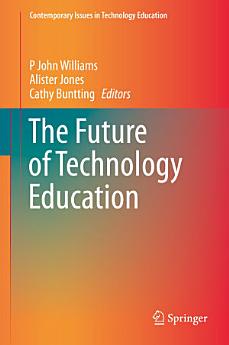The Future of Technology Education
معلومات عن هذا الكتاب الإلكتروني
This edited book is offered as a platform from which to continue discussions about how technology education might progress into the future, and how the potential of technology education to be truly relevant and valued in school learning can be achieved.
The book results from a collaboration between leading academics in the field, the wider group of authors having had input into each of the chapters. Through the development of a deep understanding of technology, based on a thoughtful philosophy, pathways are discussed to facilitate student learning opportunities in technology education. Consideration is given to the purpose(s) of technology education and how this plays out in curriculum, pedagogies, and assessment. Key dimensions, including design, critique, students’ cultural capital are also explored, as are the role and place of political persuasion, professional organisations, and research that connects with practice.
The discussion in the book leads to a conclusion that technology education has both an ethical and moral responsibility to support imaginings that sustain people and communities in harmony and for the well being of the broader ecological and social environment.
نبذة عن المؤلف
The editors work together at the University of Waikato in New Zealand.
John Williams is a professor and Director of the Technology, Environmental, Mathematics and Science Education Research Centre at the University of Waikato in New Zealand, where he teaches and supervises research students in technology education. His current research interests include mentoring beginning teachers, PCK, and electronic assessment of performance. In 2011 he was elected to the International Technology and Engineering Education Association’s Academy of Fellows for prominence in the profession.
Alister Jones is a Research Professor and Deputy Vice-Chancellor of the University of Waikato. Prior to this he was Dean of Education and the Director of the Wilf Malcolm Institute of Educational Research and the Centre for Science and Technology Education Research. He contributed significantly to the development of the technology curriculum in New Zealand, and has published extensively in technology and science education as well as general education. He is Director of a number of companies, including Cognition Education Limited, and Managing Director of the Australasian Science Education Research Association Limited.
Cathy Buntting has a background in biochemistry and biotechnology research and teaching and a PhD in education. She holds a senior research position within the University of Waikato, New Zealand, and currently manages the internationally recognised Biotechnology and Science Learning Hubs. Her research interests focus on how digital technologies can transform science and technology teaching and learning, and on the development of science and technology education policy.







